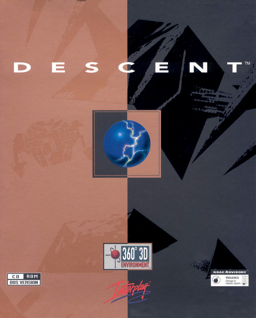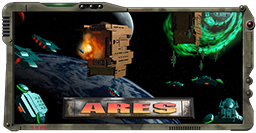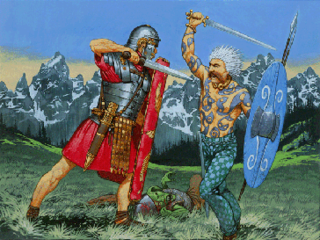| Industry | Video games |
|---|---|
| Founder | Sean Sayrs Peter Hagen Tim Phillips |
| Website | fantasoft |
Fantasoft was a computer game company which programmed and promoted a number of shareware games with a primary focus on the Apple Macintosh platform. Fantasoft has been dormant since about 2005. It was founded by Sean Sayrs, Peter Hagen, and Tim Phillips. Fantasoft was created to develop, market, and distribute the shareware game Realmz , which was MacUser Shareware Game of the Year in 1995–96. Following the success of Realmz, Fantasoft created or marketed other Macintosh and Microsoft Windows platform games, most notably Spiderweb Software's early Exile series.
Developed:
Published:
Exile is a series of role-playing video games created by Jeff Vogel of Spiderweb Software. They were released as shareware titles for Macintosh and Windows systems. Exile III was also ported to Linux by a third party. There were four games released in the series. All of the games were later revived in the Avernum series. Common to all games in the Exile series are 2D graphics and basic sound. The graphics in the first versions of Exile I and II had simple textures, colours and outlines, which were then replaced in later versions with Exile III's graphics. The games are designed to be non-linear and long in gameplay length.

Descent is a first-person shooter (FPS) game developed by Parallax Software and released by Interplay Productions in 1995 for MS-DOS, and later for Macintosh, PlayStation, and RISC OS. It popularized a subgenre of FPS games employing six degrees of freedom and was the first FPS to feature entirely true-3D graphics. The player is cast as a mercenary hired to eliminate the threat of a mysterious extraterrestrial computer virus infecting off-world mining robots. In a series of mines throughout the Solar System, the protagonist pilots a spaceship and must locate and destroy the mine's power reactor and escape being caught in the mine's self-destruction, defeating opposing robots along the way. Players can play online and compete in either deathmatches or cooperate to take on the robots.
StuffIt is a discontinued family of computer software utilities for archiving and compressing files. Originally produced for the Macintosh, versions for Microsoft Windows, Linux (x86), and Sun Solaris were later created. The proprietary compression format used by the StuffIt utilities is also termed StuffIt.
Spiderweb Software is an independent video game developer founded in 1994 by Jeff Vogel in Seattle, Washington. Its primary focus is on creating demoware games for the Apple Macintosh, Microsoft Windows, Android and the iPad. Spiderweb Software is also known for emphasizing storytelling and turn-based gameplay and using a retro style of graphics.

Presto Studios was a computer game development company of the 1990s, especially famous for its award-winning The Journeyman Project series and the 2001 sequel to Cyan's hit Myst series, Myst III: Exile.
Avernum is a series of demoware role-playing video games by Jeff Vogel of Spiderweb Software available for Macintosh and Windows-based computers. Several are available for iPad, and were formerly available for Android.
Scarab of Ra is a Mac OS shareware computer game written in 1987 by Rick Holzgrafe and released in 1988 by Semicolon Software, with a modernized version released in 2022. It is an adventure set within an Egyptian pyramid.

Softdisk was a software and Internet company based in Shreveport, Louisiana. Founded in 1981, its original products were disk magazines. It was affiliated and partly owned by paper magazine Softalk at founding, but survived its demise.

Maelstrom is a video game developed by Andrew Welch, released as shareware in November 1992 for Mac OS. The game is an enhanced clone of Atari, Inc.'s 1979 Asteroids arcade game with a visual style similar to the Atari Games 1987 sequel, Blasteroids. Maelstrom was released when there were few action games for the high-resolution color displays of the Macintosh, so it garnered much interest, despite the dated concept, and led to the creation of Ambrosia Software.
Apeiron is a Macintosh game developed and released as shareware by Ambrosia Software. An adaptation of the 1980 arcade game Centipede, it was first released on February 11, 1995. In November 2004, a Mac OS X port was made available.

Casady & Greene was a software publisher and developer active from 1988 to 2003. The company primarily released software for Macintosh, but also released software for Windows and Newton. Casady & Greene was formed in 1988 when Greene, Inc. acquired CasadyWare, a company owned by Robin Casady.

Ares is a space strategy video game created by Nathan Lamont of Bigger Planet Software, and first released by Changeling Software in 1998. In 1999 the game was re-released as shareware by Ambrosia Software and released as open source software and freeware in 2008. The key feature of the game was its ability to zoom in and out smoothly; this allowed the player to switch between a close-up view, which emphasized space combat skills, and a strategic view of the entire map.

Pangea Software is an Apple exclusive game company based in Austin, Texas, owned and operated by Brian Greenstone. Founded in 1987, the company began as a developer of Apple IIGS games, with the first being Xenocide, which was commercially published by Micro Revelations in 1989. During this period they introduced so-called "24 Hour Games" shareware, a proof of concept of what could be accomplished in a limited time. In 1991, they switched to Macintosh development; notable titles included Power Pete, Nanosaur, Bugdom, Cro-Mag Rally, and Otto Matic. Since 2008, the company has mostly ceased developing Mac games and instead chosen to focus on iOS games, due to the latter being a more lucrative market.

Realmz is a fantasy adventure and role-playing video game first developed and published by Fantasoft in 1994 for the Apple Macintosh as shareware. Fantasoft released a Microsoft Windows-compatible version in 1999, and a science fiction role-playing game based on the Realmz engine, titled New Centurions, in 2001. Realmz was originally written by Tim Phillips on a Macintosh IIsi; he also wrote four game scenarios, including the introductory scenario "City of Bywater". Other original scenario contributors were Jim Foley and Sean Sayrs.

Nethergate is a computer-based historical fantasy role-playing game published by Spiderweb Software for the Macintosh and Microsoft Windows platforms. The game was released in 1998 by Jeff Vogel, and was Spiderweb Software's first game to feature a 45° isometric viewing angle. Nethergate offers players the choice to play on either side of the story, as Celts or Romans. The game's plot allows for several endings and many side quests, which accompany the main story. Spiderweb Software released a remake called Nethergate Resurrection in May 2007.
Inside Mac Games (IMG) started in 1993 as an electronic magazine about Apple Macintosh computer gaming distributed by floppy disk, eventually becoming a website.
Mac gaming refers to the use of video games on Macintosh personal computers. In the 1990s, Apple computers did not attract the same level of video game development as Microsoft Windows computers due to the high popularity of Microsoft Windows and, for 3D gaming, Microsoft's DirectX technology. In recent years, the introduction of Mac OS X and support for Intel processors has eased porting of many games, including 3D games through use of OpenGL and more recently Apple's own Metal API. Virtualization technology and Boot Camp also permit the use of Windows and its games on Macintosh computers. Today, a growing number of popular games run natively on macOS, though as of early 2019, a majority still require the use of Microsoft Windows.

The Apple Pippin is a defunct open multimedia technology platform, designed by Apple Computer, and marketed as PiPP!N. According to Apple, Pippin was directed at the home market as "an integral part of the consumer audiovisual, stereo, and television environment."
Patrick Buckland is a British video game programmer, designer and chief executive officer of Stainless Games, which he co-founded with Neil Barnden in 1994.